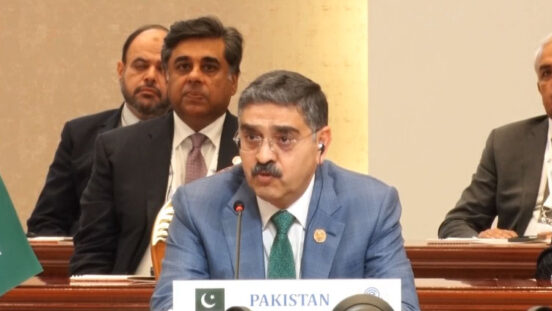By: M. Azlan Khan
“The ultimate aim of the ego is not to see something, but to be something.”(Allama Muhammad Iqbal)
Allama Muhammad Iqbal, the “Spiritual Father of Pakistan”, left an indelible mark on the collective consciousness of the nation. Every year on November 9th nation comes together to pay homage to this luminary figure whose ideas and vision continue to inspire and guide generations. The celebrations on Iqbal Day are not only a manifestation of deep respect but also a testament to the enduring significance of his teachings.
His poetry and philosophy played a significant role in the awakening of the Muslim world in the early 20th century, and he was a driving force behind the creation of Pakistan. Iqbal played a pivotal role in inspiring and shaping the vision for a separate Muslim homeland, which eventually became Pakistan in 1947. It was due to his exceptional intellectual and literary contributions that he was given the honorific title of Allama ‘Sir’ Muhammad Iqbal in 1923 by King George V. Iqbal’s poetry urged Muslims to strive for self-realization, self-discovery, and to strengthen their faith in a way that would lead to a revival of Islamic principles. His vision was deeply rooted in the belief that Muslims in India should have a distinct political identity and a state of their own where they could freely practice their religion and culture. Iqbal’s most significant political contribution was this articulation of the concept of Muslim nationhood.
Iqbal’s Allahabad Address, delivered on December 29, 1930, has often been hailed as a pivotal moment in the history of the Indian subcontinent. In this address, Iqbal presented his vision of a separate Muslim state, which would eventually become Pakistan. Iqbal’s ideas laid the foundation for the Lahore Resolution, also known as the Pakistan Resolution, passed on March 23, 1940. It served as a pivotal moment in the Pakistan movement. He argued that Muslims in India should unite as a separate political entity because they possessed a unique cultural and religious identity that was distinct from the Hindu majority.
Iqbal’s teachings and philosophy continue to influence Pakistan’s political, social, and cultural fabric long after the country’s creation. Iqbal’s emphasis on an Islamic system of governance and constitutional principles that align with Islamic values has significantly shaped Pakistan’s constitution. The Objectives Resolution of 1949 and the inclusion of Islamic provisions in subsequent constitutional amendments reflect Iqbal’s influence. Iqbal’s call for a distinct Muslim identity is a cornerstone of Pakistan’s national consciousness. His poetry and philosophy are often invoked to strengthen the bonds of national unity and to preserve the cultural and religious heritage of the nation. Iqbal’s strong advocacy for education and research, particularly in the realm of philosophy and the humanities, has led to the establishment of numerous educational institutions dedicated to his teachings like The Allama Iqbal Open University and the Iqbal Academy.
Iqbal’s ideas on spiritual and philosophical matters have gained recognition on the international level. His philosophy of the “Self” and his ideas on the revival of the Muslim world continue to inspire thinkers, scholars, and leaders worldwide. Iqbal’s poetry, filled with messages of self-realization, ambition, and spiritual awakening, continues to inspire individuals across the globe. His work is not just admired for its aesthetics, but also for its ability to uplift and motivate.
His famous works including Bang-e-Dra, Asrar-e-Khudi, Payam-e-Mashriq, and Khizr-e-Rah are a collection of thought-provoking poetry that urges readers to introspect, question, and strive for self-improvement. Iqbal’s keen insight into the challenges of the modern world and his call for self-discovery and spiritual awakening continues to inspire readers worldwide. Through his poetry, he encourages a revival of Eastern ideals and values. Iqbal’s message transcends borders, appealing to a sense of unity among nations of the East. His work serves as a moral compass that urges individuals to make ethical choices and uphold justice in their lives. Iqbal’s message in “Khizr-e-Rah” is a call to action, emphasizing the importance of principles and values in the face of adversity. The poem resonates with those who strive to lead lives guided by truth and righteousness. His famous poems, such as “Lab Pe Aati Hai Dua Ban Ke Tamanna Meri” and “Shaheen,” continue to inspire individuals to rise above their limitations and pursue their dreams with unwavering determination.
November 9, which also happens to be Iqbal’s birthday, was officially declared a public holiday in Pakistan by General Muhammad Zia-ul-Haq in 1979. Iqbal Day is celebrated with great fervor and enthusiasm throughout Pakistan. This day allows people to participate in various activities that honor the life and contributions of Allama Iqbal. Educational institutions, governmental bodies, and cultural centers organize seminars and discussions to delve deep into Iqbal’s literary and philosophical works. Television and radio channels air special programs dedicated to Iqbal’s life and work. Newspapers and magazines often feature articles and poetry, and profiles about his life.
Iqbal Day serves as a potent reminder of the enduring significance of Allama Iqbal’s ideas and philosophy. The government’s dedication in celebrating this day underscores the importance of Iqbal’s vision and its relevance in shaping the nation’s future. It is a day when Pakistan, through government-led initiatives and the collective spirit of its people, renews its commitment to the ideals and teachings of a man whose work is a guidance for every era. In an increasingly connected yet fragmented world, Iqbal’s message of unity, self-discovery, and spiritual awakening resonates as strongly as ever, igniting the spirit of Pakistan with an eternal flame of inspiration.




